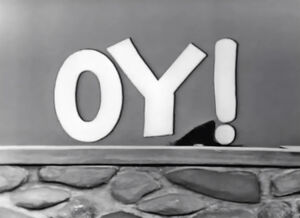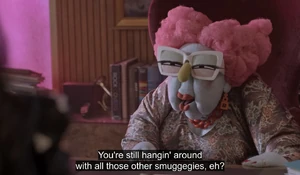
Yiddish is a language originated among Ashkenazi Jews in Europe during medieval times and developed from Germanic languages. By the 20th century, immigration to the United States of America spread Yiddish, taking particular root in New York City, and some new variants originated in the states.
Many Yiddish words and expressions, sometimes with spelling or meaning adjustments, entered the English vernacular, including blintzes, schlock, glitch, and klutz. Others remained more closely associated with Jewish communities or, eventually, show business.
References

- The exclamation "Oy!" (sometimes used in its own right as "Oh," or as a shorthand for "Oy vey") appears on-screen during Rowlf's "Batdog" fight in the February 18, 1966 broadcast of The Jimmy Dean Show.
- "Oy!" crops up again, delivered by the Spook, in The Wizard of Id pilot.
- Mr. Hooper periodically speaks Yiddish on Sesame Street. Examples include Episode 0687 (after encountering people speaking American Sign Language, Spanish, and even tweeting in Bird, he has a telephone conversation in Yiddish), Episode 1074 (taking a phone order from Mrs. Zarow), and Episode 1412 (reading a Yiddish newspaper). He also sings the traditional Yiddish song "Katchke Green" on the album Sleepytime Bird.
- On Sesamstrasse, Lefty the Salesman is renamed "Schlemihl" (the German spelling of schlemiel, meaning fool and indicating the fact that Ernie almost invariably comes out on top over him).
- Big Bird utters, "Oy vey," in Episode 0136 of Sesame Street as he frets about not doing anything right.
- Tiffany Gonzales, during the panel discussion in The Muppet Show episode 105, addresses a Whatnot panelist as boychik (typically a term of endearment, but here used sarcastically).
- Avery Schreiber, guest star of The Muppet Show episode 116, jests that Avery comes from the Yiddish, meaning "hold the mayo."
- Benny Brillstein, the Yiddish Yodeler, is not the guest star of The Muppet Show episode 519. The fill-in guest Chris Langham, during the Hawaiian cowboy closing number, utters an "Oy vey."
- Dr. Kvetch, the recurring Grouch physician, is named after the Yiddish word which originally meant to press or squeeze but in usage has come to indicate complaining.
- Big Bird tells the Birdketeers in Episode 2455 that "mazel tov" means congratulations in Yiddish: "Mr. Looper told me that."
- The word "schlep" (meaning to drag, pull, or carry something) is used at least twice by Sesame Street characters. A sheep in a "Spaceship Surprise" sketch about the SH sound mentions schlepping shiny shoes from a store, and Stinky the Stinkweed claims that he cannot "schlep around a pocketbook" to keep his baby pictures in during Episode 3720.
- Sonny Friendly describes the simple rules for "The Air Game" in Sesame Street Episode 2536 as "the whole geshmeer," a derivative of the Yiddish word "shmeer."
- Captain Shnook takes his surname from the originally Yiddish word indicating a nobody or a dupe.
- In the "Monsterpiece Theater" production of "Little Red Riding Hood," Cookie Monster's grandmother addresses him as "me little cookala" (a variation on bubbeleh, a term of endearment often used for children).
- The Fiddler on the Roof installment of "Monsterpiece Theater" has the Tevye counterpart saying "I'm plotzing" (to be beside one's self with strong emotion) and covering his eyes. The script also has him using the interjection "Nu?" but the final version simply uses "No?" When the roof collapses and the fiddlers land on Alistair Cookie, he keeps in the spirit of the piece by uttering "Oy gevalt!" (meaning shock or alarm, greater than "Oy vey").
- Billy Crystal says "Oy vey, that was hot" in Muppets Tonight episode 103.
- Abby and Gonnigan attempt to find an alarm clock to awaken Blögg in the Abby's Flying Fairy School installment "Sleeping Blöggy." In the process, they find a cuckoo clock who exclaims "Cuckoo! I'm totally meshuggeneh!" (the Yiddish word for crazy).
- One of the many Animals who populate New York in the first Lipton "Be More Tea" spot is an elderly gent who exclaims "Oy vey gevalt!"
- Grover attempts to feed a plant Hungarian goulash (a popular kosher meal) in a plant care sketch. (First: Episode 4716) When the plant fails to eat, a frustrated Grover says "Oy gevalt!"
- Penny Waxman regularly peppers her speech with Yiddish in The Muppets Mayhem. In the first episode, for example, she refers to Dr. Teeth and the Electric Mayhem as "schmegeggies" (defined in The Joys of Yiddish as meaning contemptible persons or idiots).